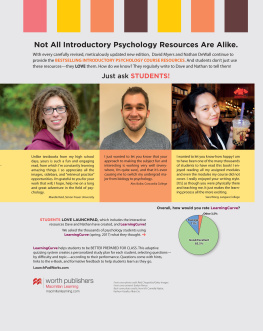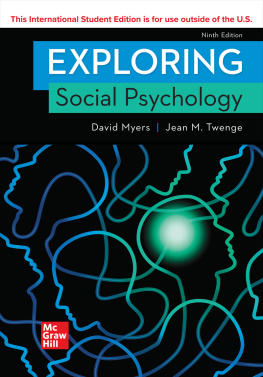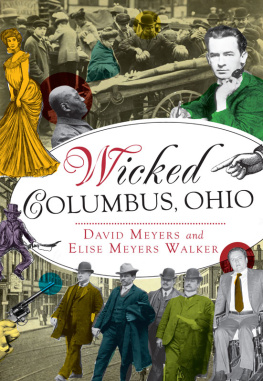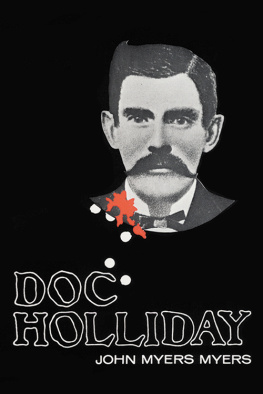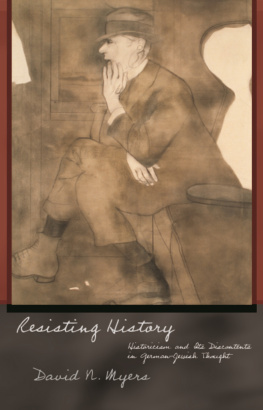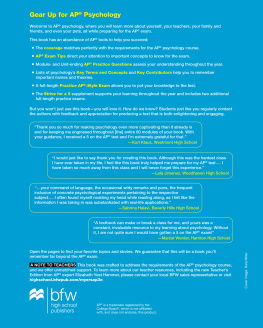David Myers - Psychology in Modules, Twelfth Edition
Here you can read online David Myers - Psychology in Modules, Twelfth Edition full text of the book (entire story) in english for free. Download pdf and epub, get meaning, cover and reviews about this ebook. year: 2016, publisher: Macmillan Higher Education, genre: Politics. Description of the work, (preface) as well as reviews are available. Best literature library LitArk.com created for fans of good reading and offers a wide selection of genres:
Romance novel
Science fiction
Adventure
Detective
Science
History
Home and family
Prose
Art
Politics
Computer
Non-fiction
Religion
Business
Children
Humor
Choose a favorite category and find really read worthwhile books. Enjoy immersion in the world of imagination, feel the emotions of the characters or learn something new for yourself, make an fascinating discovery.
- Book:Psychology in Modules, Twelfth Edition
- Author:
- Publisher:Macmillan Higher Education
- Genre:
- Year:2016
- Rating:3 / 5
- Favourites:Add to favourites
- Your mark:
- 60
- 1
- 2
- 3
- 4
- 5
Psychology in Modules, Twelfth Edition: summary, description and annotation
We offer to read an annotation, description, summary or preface (depends on what the author of the book "Psychology in Modules, Twelfth Edition" wrote himself). If you haven't found the necessary information about the book — write in the comments, we will try to find it.
Psychology in Modules, Twelfth Edition — read online for free the complete book (whole text) full work
Below is the text of the book, divided by pages. System saving the place of the last page read, allows you to conveniently read the book "Psychology in Modules, Twelfth Edition" online for free, without having to search again every time where you left off. Put a bookmark, and you can go to the page where you finished reading at any time.
Font size:
Interval:
Bookmark:
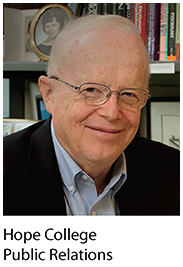
David Myers received his B.A. in chemistry from Whitworth University, and his psychology Ph.D. from the University of Iowa. He has spent his career at Hope College in Michigan, where he has taught dozens of introductory psychology sections. Hope College students have invited him to be their commencement speaker and voted him outstanding professor.
His research and writings have been recognized by numerous awards and honors, including the Gordon Allport Intergroup Relations Prize, an Honored Scientist award from the Federation of Associations in Behavioral & Brain Sciences, an Award for Service on Behalf of Personality and Social Psychology, a Presidential Citation from APA Division 2, election as an American Association for the Advancement of Science Fellow, and three honorary doctorates.
With support from National Science Foundation grants, Myers scientific articles have appeared in three dozen scientific periodicals, including Science, American Scientist, Psychological Science, and the American Psychologist. In addition to his scholarly and textbook writing, he digests psychological science for the general public. His writings have appeared in four dozen magazines, from Todays Education to Scientific American. He also has authored five general audience books, including The Pursuit of Happiness and Intuition: Its Powers and Perils.
David Myers has chaired his citys Human Relations Commission, helped found a thriving assistance center for families in poverty, and spoken to hundreds of college, community, and professional groups worldwide.
Drawing on his experience, he also has written articles and a book (A Quiet World) about hearing loss, and he is advocating a transformation in American assistive listening technology (see HearingLoop.org). For his leadership, he has received awards from the American Academy of Audiology, the hearing industry, and the Hearing Loss Association of America.
David and Carol Myers met and married while undergraduates, and have raised sons Peter and Andrew, and a daughter, Laura. They have one grandchild, Allie (seen on page 165).
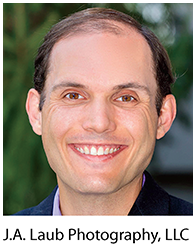
Nathan DeWall is professor of psychology and director of the Social Psychology Lab at the University of Kentucky. He received his bachelors degree from St. Olaf College, a masters degree in social science from the University of Chicago, and a masters degree and Ph.D. in social psychology from Florida State University. DeWall received the College of Arts and Sciences Outstanding Teaching Award, which recognizes excellence in undergraduate and graduate teaching. The Association for Psychological Science identified DeWall as a Rising Star early in his career for making significant contributions to the field of psychological science.
DeWall conducts research on close relationships, self-control, and aggression. With funding from the National Institutes of Health and the National Science Foundation, he has published over 190 scientific articles and chapters. DeWalls research awards include the SAGE Young Scholars Award from the Foundation for Personality and Social Psychology, the Young Investigator Award from the International Society for Research on Aggression, and the Early Career Award from the International Society for Self and Identity. His research has been covered by numerous media outlets, including Good Morning America, the Wall Street Journal, Newsweek, Atlantic Monthly, the New York Times, the Los Angeles Times, the Harvard Business Review, USA Today, National Public Radio, the BBC, and The Guardian. He has lectured nationally and internationally, including in Hong Kong, China, the Netherlands, England, Greece, Hungary, Sweden, and Australia.
Nathan is happily married to Alice DeWall and is the proud father of Beverly Bevy and Ellis. He enjoys playing with his two golden retrievers, Finnegan and Atticus. In his spare time, he writes novels, watches sports, tends his chickens and goats, and runs and runs and runs. He has braved all climatesfrom the snowy trails of Michigan to the scorching sands of the Sahara Desertto complete over 1000 miles worth of ultramarathons.
For most people, to live is to work. Work is lifes biggest waking activity. Work helps satisfy multiple needs. Work supports us, enabling food, water, and shelter. Work connects us, meeting our social needs. Work helps define us. Meeting someone for the first time and wondering about their identity, we may ask, So, what do you do?
But the answer may give us only a partial picture of a persons life. We have many motives beyond work, including the desire for family, friends, and hobbies. We also vary in our job satisfaction. On the day we leave the workforce, some of us will sadly bid our former employer farewell; others will bid our former employer good riddance. What factors influence our perceptions of work as an activity marked by frustration versus flow, as a necessary chore versus a meaningful calling, or as an opportunity to do the bare minimum versus maximize our potential?
 Work and Life Satisfaction
Work and Life SatisfactionLOQ LEARNING OBJECTIVE QUESTION A-1 What is flow?
Individuals across various occupations vary in their attitudes toward their work. Some view their work as a job, an unfulfilling but necessary way to make money. Others view their work as a career, an opportunity to advance from one position to a better position. The restthose who view their work as a calling, a fulfilling and socially useful activityreport the highest satisfaction with their work and with their lives (Dik & Duffy, 2012; Wrzesniewski & Dutton, 2001).
This finding would not surprise Mihaly Csikszentmihalyi [chick-SENT-me-hi] (1990, 1999). He observed that our quality of life increases when we are purposefully engaged. Between the anxiety of being overwhelmed and stressed, and the apathy of being underwhelmed and bored, lies a zone in which we experience . Can you recall being in a zoned-out flow state while texting or playing a video game? If so, then perhaps you can sympathize with the two Northwest Airlines pilots who in 2009 were so focused on their laptops that they missed their control towers messages. The pilots flew 150 miles past their Minneapolis destinationand lost their jobs.
flow a completely involved, focused state, with diminished awareness of self and time; results from full engagement of our skills.The jobs people do: Columnist Gene Weingarten (2002) noted that sometimes a humor writer knows when to just get out of the way. Here are some sample job titles from the U.S. Department of Labor Dictionary of Occupational Titles: animal impersonator, human projectile, banana ripening-room supervisor, impregnator, impregnator helper, dope sprayer, finger waver, rug scratcher, egg smeller, bottom buffer, cookie breaker, brain picker, hand pouncer, bosom presser, and mother repairer.
Csikszentmihalyi formulated the flow concept after studying artists who spent hour after hour painting or sculpting with focused concentration. Immersed in a project, they worked as if nothing else mattered, and then, when finished, they promptly forgot about it. The artists seemed driven less by external rewardsmoney, praise, promotionthan by the intrinsic rewards of creating their art. Nearly 200 other studies confirm that
Font size:
Interval:
Bookmark:
Similar books «Psychology in Modules, Twelfth Edition»
Look at similar books to Psychology in Modules, Twelfth Edition. We have selected literature similar in name and meaning in the hope of providing readers with more options to find new, interesting, not yet read works.
Discussion, reviews of the book Psychology in Modules, Twelfth Edition and just readers' own opinions. Leave your comments, write what you think about the work, its meaning or the main characters. Specify what exactly you liked and what you didn't like, and why you think so.

